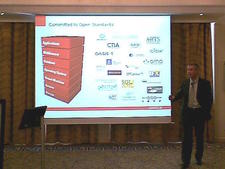Oracle Goes with Own DB, SPARC and UNIX
In Munich, Wednesday, March 10, Oracle announced its upcoming strategy for the Sun takeover: the new couple will now sell complete packages and, next to Oracle's database, further develop Solaris along with Sun's SPARC and Flashfire server technologies.
Managing director of Oracle Germany, Juergen Kunz, described the situation at Oracle, which had some time to ferment after the European Union's investigation of the takeover, as such: language inside the company includes words like "pregnancy" and "bringing up baby." Sun brings a "totally new dimension." The portolio is "unique" and "no other company can provide the same." Dermot O'Kelly, Oracle's vice president for hardware in Europe, put the situation in concrete terms with the new "Oracle Stack."
Oracle Wrap
The stack starts on the hardware side with storage, servers and virtual machines under the motto "Complete, open, integrated," continues with operating systems and databases and goes to middleware and applications. The message is clear: the more a customer buys an integrated system from Oracle, the better the results. Existing infrastructure elements can even be integrated.

O'Kelly was proud of the first products to be whipped up in the mix of Oracle and Sun competencies. The Bolide Exadata v2 first announced in September, 2009 and a database machine with Sun hardware and Oracle software should give IBM a run for its money. The hardware VP feels that Oracle will "stir up the market" in the future with the combined products.
Rolf Kersten, marketing manager at Sun Microsystems, outlined what it all should look like. Oracle will no longer just consider itself first in databases, but also in the UNIX server market. Oracle wants to invest more than Sun previously in the Solaris "technology diamond" and SPARC processors. Even the x86 machines will be further developed as elements of integrated systems as well as freestanding solutions. All hardware will be optimized for the Oracle database, for which the company is promising large performance gains.
MySQL? Yes, but...
Asked by Linux Magazine Online if the same sort of strategy exists for MySQL setups, for example, Kersten, who has been at Sun for 12 years, responded with "yes," but only after repeated questioning. His first responses included words like "third-party" and "certification." Finally he committed to the statement, "MySQL ultimately belongs to the inhouse products." Until further notice, let the answer to the MySQL question be interpreted as "yes, but..."

Insiders believe that Oracle will deploy its own database and MySQL in different segments and therefore not get into an internal rivalry. These sources don't consider Oracle's MySQL coming into much play in the high-end segment. Other observers see parallels between Oracle's Sun acquisition and that of SUSE by Novell: a license-oriented enterprise pulls in another open-source-oriented one and behaves awkwardly as a consequence.
The event did unfortunately reveal that Oracle is unlikely to include Linux or open source as strategic advantages in the marketplace, even though the company quite recently maintained that it understood the open source principle better than did the European Commission. Open standards did deserve mention, but it's more likely that the open source divisions with MySQL, OpenOffice and the free Java components will continue to get niche status. Commitments to the projects are nevertheless real.
Subscribe to our Linux Newsletters
Find Linux and Open Source Jobs
Subscribe to our ADMIN Newsletters
Support Our Work
Linux Magazine content is made possible with support from readers like you. Please consider contributing when you’ve found an article to be beneficial.

News
-
Introducing matrixOS, an Immutable Gentoo-Based Linux Distro
It was only a matter of time before a developer decided one of the most challenging Linux distributions needed to be immutable.
-
Chaos Comes to KDE in KaOS
KaOS devs are making a major change to the distribution, and it all comes down to one system.
-
New Linux Botnet Discovered
The SSHStalker botnet uses IRC C2 to control systems via legacy Linux kernel exploits.
-
The Next Linux Kernel Turns 7.0
Linus Torvalds has announced that after Linux kernel 6.19, we'll finally reach the 7.0 iteration stage.
-
Linux From Scratch Drops SysVinit Support
LFS will no longer support SysVinit.
-
LibreOffice 26.2 Now Available
With new features, improvements, and bug fixes, LibreOffice 26.2 delivers a modern, polished office suite without compromise.
-
Linux Kernel Project Releases Project Continuity Document
What happens to Linux when there's no Linus? It's a question many of us have asked over the years, and it seems it's also on the minds of the Linux kernel project.
-
Mecha Systems Introduces Linux Handheld
Mecha Systems has revealed its Mecha Comet, a new handheld computer powered by – you guessed it – Linux.
-
MX Linux 25.1 Features Dual Init System ISO
The latest release of MX Linux caters to lovers of two different init systems and even offers instructions on how to transition.
-
Photoshop on Linux?
A developer has patched Wine so that it'll run specific versions of Photoshop that depend on Adobe Creative Cloud.
